Central Bank of Iran orders banks to open books
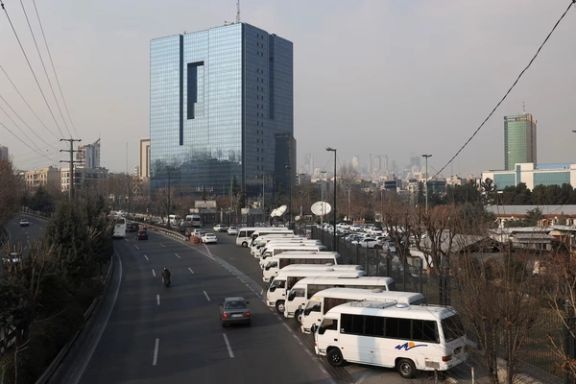
The Central Bank of Iran (CBI) has demanded new measures to force transparency from banks and financial institutions, citing widespread failure to comply with existing freedom of information laws.

The Central Bank of Iran (CBI) has demanded new measures to force transparency from banks and financial institutions, citing widespread failure to comply with existing freedom of information laws.
The directive, reported by Tasnim News Agency on Sunday, mandates dedicated online portals for immediate publication of non-confidential financial data including information on financial policies, loan facilities, and regulatory directives.
It also ordered banks and non-bank credit institutions to establish units to handle public inquiries within a strict 10-day deadline.
Aimed at bolstering public trust and accountability, the move comes in response to repeated violations of the Law on Publication and Free Access to Information, according to the CBI.
The CBI said that inspections reveal banks are consistently failing to comply with transparency laws, adding that this undermines public trust and hinders access to crucial financial information.
The measure comes as Iran slides to 151st out of 180 countries in Transparency International's 2024 Corruption Perceptions Index (CPI).
The CPI, which assesses perceived public sector corruption, shows Iran's continued decline, with a score of just 23 out of 100. The index highlights concerns over bribery, misuse of public funds, and limited access to information.
In October 2023, a report by the World Bank placed Iran among the worst countries in the world in terms of Worldwide Governance Indicators, with a Voice and Accountability Index score of -1.45, placing it among the lowest for political participation, free expression, and media freedom."
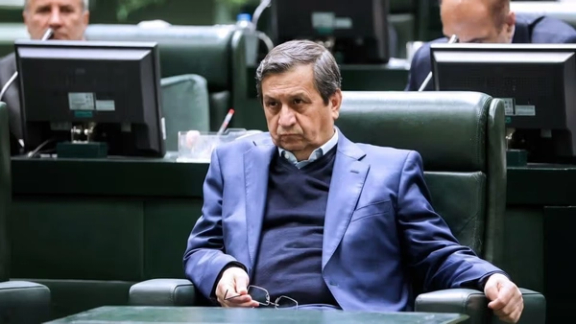
Iran’s parliament impeached Economy Minister Abdolnaser Hemmati, bringing his tenure to an end after lawmakers blamed him for the country’s worsening economic crisis.
The vote followed a heated session in which Hemmati defended his record while critics pointed to the surging exchange rate and rising inflation.
Parliament voted 182 to 89 in favor of impeachment, with one abstention and one void ballot out of 273 total votes. Under Article 135 of Iran’s Constitution, ministers remain in office unless dismissed by the president or voted out by parliament.
The impeachment was initiated by 119 members of parliament, citing currency instability, the devaluation of the rial, and increasing food prices. Following speeches from both supporters and opponents of Hemmati, lawmakers cast their votes in favor of removing him from office.
President Masoud Pezeshkian attended the session, defending Hemmati by saying that Iran is operating under severe financial constraints.
“The country is in a state of war. Even Qatar, Turkey, and Iraq are not returning our dollars,” he said. Hemmati, for his part, sought to reassure lawmakers by arguing that “the exchange rate will decrease.”
The value of the Iranian rial has sharply declined, with the US dollar now trading at 940,000 rials, further straining households and businesses. Inflation has remained persistently high, with the price of essential goods continuing to rise.
Hemmati acknowledged the hardship, saying: “We understand the devastation that seven consecutive years of over 40% inflation have inflicted on the people. We know that people are suffering under the economic situation.”
During his defense, Hemmati highlighted efforts to increase government revenue through taxation since coming to office last year under Pezeshkian.
“Seventy percent of the government’s expenses are covered through tax revenues. The tax organization generated 1700 trillion rials ($1.8 billion) in revenue over the past month. If the tax organization neglects its duties even for a single day, we won’t be able to pay salaries,” he said.
Some lawmakers accused the government of deliberately allowing the exchange rate to climb. Hemmati rejected the statement, adding: “The dollar rate is not real, and we will certainly bring it down.” He also linked Iran’s economic struggles to US policies, warning that “Trump has officially declared economic war against us.”
Some commentators in Iran have argued that without a deal with the US and the removal of sanctions, the economy cannot improve. Others contend that removing Hemmati alone will do little to address the country’s deeper economic challenges.
The president can appoint an interim minister for up to three months in the absence of a permanent replacement.
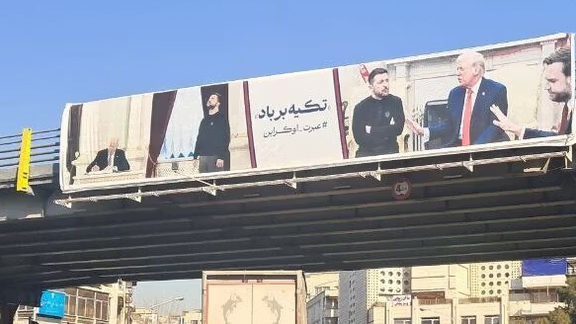
Banners featuring the heated Oval Office exchange between US president and his Ukrainian counterpart have appeared across Tehran, echoing Iran's Supreme Leader’s criticism of Ukraine’s reliance on the United States.
The banners display phrases such as "End of the mirage" and "Leaning on the wind," referencing Ukraine’s ties with Washington.
The campaign underscore Iran's hardliners’ argument that the Trump-Zelensky clash validates Supreme Leader Ali Khamenei’s ban on negotiations with the United States.
Donald Trump and Volodymyr Zelensky's confrontation occurred during their meeting on Friday which intended to finalize a minerals agreement granting the US access to Ukraine's rare earth elements—a deal seen as a step toward a potential ceasefire with Russia - a long time Tehran ally.
The discussion escalated when Trump accused Zelensky of risking global conflict by refusing to make concessions to Russia, leading to an abrupt end to the meeting and the cancellation of the agreement.
Shortly after the Oval Office clash, Khamenei’s office reposted his 2022 remarks warning that Ukraine’s trust in the US was a mistake, saying that Washington cannot be trusted.
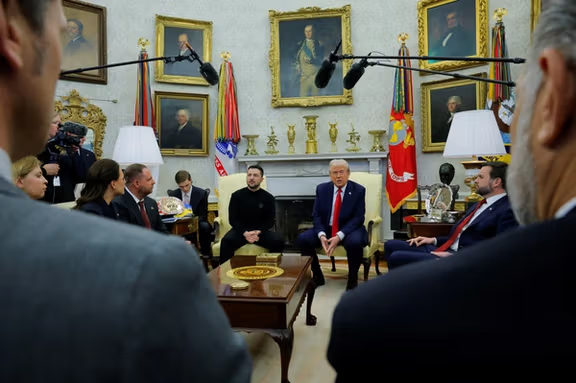
Iran's establishment daily called Ukrainian President Volodymyr Zelensky’s showdown with US President Donald Trump a victory and an example of talking but not conceding to Washington.
"Zelensky's victorious confrontation with Trump showed that one can negotiate with the devil and prevail. It is not the case that every negotiation leads to concessions," the newspaper wrote in an editorial on Sunday, praising the Ukrainian leader’s defiance during a tense Oval Office meeting on Friday.
"Some believe negotiation with America is futile. But Zelensky demonstrated that with courage and clarity, one can not only resist pressure but emerge triumphant," it added.
The paper said that while Trump and his team attempted to corner Zelensky, pressuring him to accept a peace plan favorable to both Moscow and Washington, “Instead, Zelensky removed the mask from Trump's face" and publicly accused the US of falling for Russian deception. "The arrogance Trump displayed was shattered by Zelensky's frank and courageous behavior."
Shortly after the meeting between Trump and Zelensky made international headlines, the office of Iran's Supreme Leader seized the moment to revive his warnings about reliance on the West.
Ali Khamenei's official X account reposted his 2022 remarks on Ukraine. "The first lesson from the situation in Ukraine is that Western support for countries and governments that are their puppets is a mirage," it said. "All governments must understand this. Those governments relying on the US and Europe should look at the current situation in Ukraine."
Khamenei has banned diplomatic talks with the US, in spite of support from the likes of the country's president. Last month the Supreme Leader called negotiations "neither wise, nor intelligent, nor honorable."
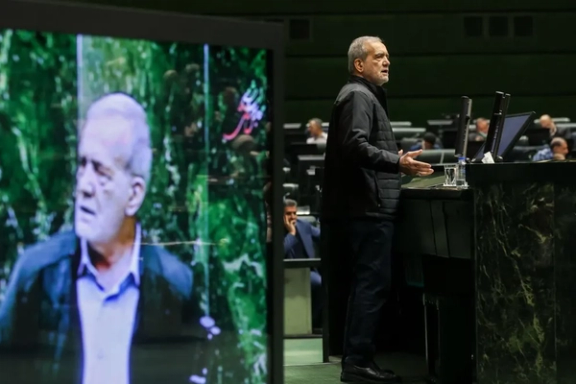
The Iranian president told parliament on Sunday that he initially supported negotiations with the United States but deferred to Supreme Leader Ali Khamenei’s position against engaging in talks.
“I believed it was better to engage in dialogue, but when the Leader said we would not negotiate with the US, I said, ‘We will not negotiate with the US, period,’” Masoud Pezeshkian said.
He added that government policy must align with Supreme Leader Ali Khamenei’s stance on the issue.
Khamenei, the country's ultimate decision-maker, rejected the idea of talks with Trump last month, calling them "neither wise, nor intelligent, nor honorable."
Speaking during the impeachment session of Minister of Economy Abdolnaser Hemmati, Pezeshkian described the challenges his administration faced upon taking office.
“When we took over the government, there was an imbalance in water, gas, electricity, and money,” he said, referring to the country's shortages.
Critics of Hemmati’s economic policies attribute the skyrocketing dollar exchange rate, rising food prices, and overall inflation to his leadership. The US dollar has surged to 940,000 rials, placing severe strain on households and businesses.
Addressing broader geopolitical issues, Pezeshkian likened the current situation to wartime conditions, citing incidents such as the killing of former Hamas leader Ismail Haniyeh on the first working days of his government and developments in Syria and Lebanon.
“We are in a full-scale war and must adopt a wartime posture... Today’s war is worse and more difficult than the war with Iraq,” he said.
He also referenced US sanctions on Iranian shipping, adding, “Trump imposed extensive sanctions on our ships, and now they are stuck, unable to unload their cargo... Qatar, Iraq, Turkey, and many other countries are not returning our dollars.”
During the impeachment hearing, lawmakers in favor of Hemmati’s removal argued that his policies had worsened the economic crisis.
One of these critics, MP Jabar Kouchaki-Nejad, criticized the government’s economic team, saying their performance had affected all social classes.
“Hemmati explicitly told us that the issues of currency depreciation and inflation have nothing to do with him,” Kouchaki-Nejad said.
MP Rouhollah Izadkhah also pointed out that the national currency had lost 62% of its value in a few months, while Rasoul Bakhshi Kouhpayeh pointed out that the exchange rate of the US dollar in Iran had increased 13,000 times over the past 50 years.
Hemmati defended his record, arguing that inflation had fallen by 10% under his tenure. “Seventy percent of the government’s expenses are covered through taxes. In the past month alone, the tax organization has collected 1700 trillion rials ($1.8 billion) in revenue,” he said.
He dismissed accusations that the government deliberately increased the exchange rate, saying, “The dollar rate is not real, and we will certainly bring it down.”
Some commentators, analysts and media outlets in Iran have pointed out in recent months that without a deal with the US and removal of sanctions the economy cannot improve. Some have also argued that impeaching a minister would not help to improve the situation.
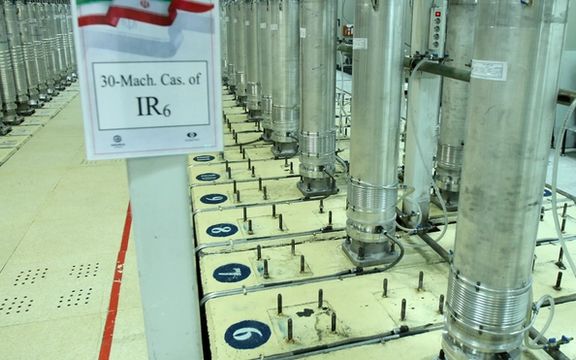
The Israeli ambassador to the US, Yechiel Leiter, warned that Iran is rapidly advancing its nuclear program while refusing to cooperate with the nuclear watchdog, arguing that diplomatic efforts to contain Tehran have failed.
“Right now we’re at a pivotal moment because Iran is racing forward in the nuclear program,” Leiter said in an interview with Fox News, pointing to the upcoming March 3 meeting of the International Atomic Energy Agency (IAEA).
“They’re supposed to produce a report on Iranian progress, but they won’t be able to because Iran doesn’t really cooperate with the IAEA.”
In 2023, Iran banned around one third of the IAEA's inspectors and the IAEA's chief, Rafael Grossi, said last month, “Iran is not still cooperating as we would like them to do.”
Leiter accused Iran’s leadership of lying about its nuclear ambitions and dismissed diplomatic efforts. “These people are liars. They’re charming liars. But they lie,” he said.
He added that Iran has openly declared its intention to destroy Israel and warned that its missile attacks on Israeli cities were part of a broader campaign against the West.
“They call us the little Satan. The United States is the big Satan. And they’re coming for Western civilization as a whole," he said.
He dismissed efforts to negotiate with Iran, saying, “You can’t talk Iran out of this.” He contrasted the Trump administration’s approach with prior US policies, praising former President Donald Trump for withdrawing from the 2015 nuclear deal.
“There’s real clarity on the Iranian situation within the Trump administration,” he said, emphasizing strong coordination between Trump and Israeli Prime Minister Benjamin Netanyahu.
Leiter's remarks come amid growing concerns over Iran’s uranium enrichment program.
Last Wednesday, the IAEA found that Iran's stock of near-bomb-grade uranium has risen to levels which in principle could be refined further into the equivalent of six nuclear bombs, according to a Reuters report citing confidential IAEA files.